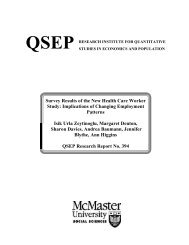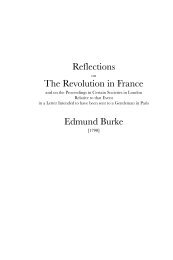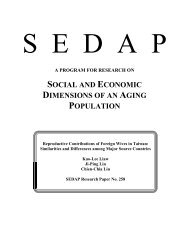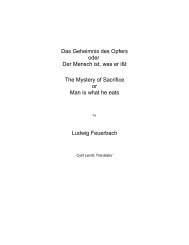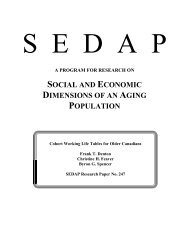Two Treatises Government John Locke - Faculty of Social Sciences ...
Two Treatises Government John Locke - Faculty of Social Sciences ...
Two Treatises Government John Locke - Faculty of Social Sciences ...
You also want an ePaper? Increase the reach of your titles
YUMPU automatically turns print PDFs into web optimized ePapers that Google loves.
48/<strong>John</strong> <strong>Locke</strong>doubt, from the inference he makes ill these words immediately following,“I see not then how the children <strong>of</strong> Adam, or <strong>of</strong> any man else, can befree from subjection to their parents.” Whereby it appears that the poweron one side, and the subjection on the other, our author here speaks <strong>of</strong>,is that natural power and subjection between parents and children: forthat which every men’s children owed could be no other; and that ourauthor always affirms to be absolute and unlimited. This natural power<strong>of</strong> parents over their children Adam had over his posterity, says ourauthor; and this power <strong>of</strong> parents over their children, his children hadover theirs in his lifetime, says our author also; so that Adam, by anatural right <strong>of</strong> father, had an absolute, unlimited power over all hisPosterity, anal at the saline time his children had by the same right absolute,unlimited power over theirs. Here then are two absolute, unlimitedpowers existing together, which I would love any body reconcile one toanother, or to common sense. For the salvo he has put in <strong>of</strong> subordinationmakes it more absurd: to have one absolute, unlimited, nayunlimitable power in subordination to another, is so manifest a contradiction,that nothing can be more. “Adam is absolute prince, with the unlimited authority <strong>of</strong> fatherhood over all his posterity;” all his posterityare then absolutely his subjects; anal as our author says, his slaves,children, and grandchildren, are equally in this state <strong>of</strong> subjection andslavery; and yet, says our author, “the children <strong>of</strong> Adam have paternal,i.e., absolute, unlimited power over their own children:” which in plainEnglish is, they are slaves and absolute princes at the same time, and inthe same government; and one part <strong>of</strong> the sum jects have an absolute,unlimited power over the other by the natural right <strong>of</strong> parentage.§70. If any one will suppose in favour <strong>of</strong> our author, that he heremeant that parents, who are in subjection themselves to the absoluteauthority <strong>of</strong> their father, have yet some power over their children; Iconfess he is something nearer the truth: but he will not at all herebyhelp our author: for he nowhere speaking <strong>of</strong> the paternal power, but asan absolute, unlimited authority, cannot be supposed to understand anything else here, unless he himself had limited it, and showed how far itreached; and that he means here paternal authority in that large extent,is plain from the immediately following words: “This subjection <strong>of</strong> childrenbeing,” says he, “the foundation <strong>of</strong> all regal authority,” p. 12. Thesubjection then that in the former line, he says, “every man is in to hisparents,” and consequently what Adam’s grandchildren were in to theirparents, was that which was the fountain <strong>of</strong> all regal authority, i.e.,




